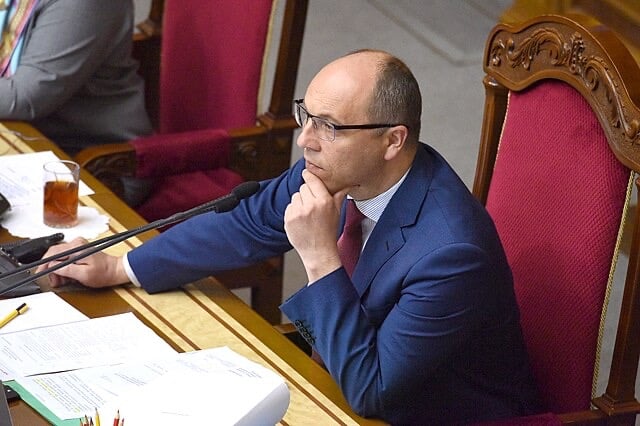Former Ukrainian parliament speaker Andriy Parubiy has been assassinated in broad daylight by a masked gunman in the western city of Lviv, sparking an urgent manhunt and sending shockwaves through Ukraine’s political establishment.
The 54-year-old politician, who played a pivotal role in Ukraine’s Euromaidan revolution and served as parliamentary speaker from 2016 to 2019, was shot multiple times on Yefremova Street near his residence at approximately noon local time on Saturday, dying instantly at the scene.
Police discovered eight shell casings at the crime scene, with sources telling local media the assassin was disguised as a delivery courier and fled on an electric bicycle after firing what authorities described as a short-barrelled firearm.
Ukraine’s Minister of Internal Affairs, Ihor Klymenko, and Prosecutor General Ruslan Kravchenko have just reported the first known circumstances of the horrendous murder in Lviv, President Volodymyr Zelensky said in a statement. “Andriy Parubiy was killed. My condolences to his family and loved ones.”
The president described the killing as “carefully planned” and confirmed that the Security Service of Ukraine (SBU) had joined the National Police in launching a full-scale murder investigation. “All necessary forces and means are engaged in the investigation and search for the killer,” Zelensky added.
Local police initially announced that a “well-known public and political figure born in 1971” had been killed in the Frankivskyi district before Parubiy’s identity was confirmed by multiple senior officials and fellow parliamentarians.
Former President Petro Poroshenko condemned the assassination in stark terms, calling it “a shot fired at the heart of Ukraine” and suggesting the killing was politically motivated. “Andriy was a great man and a true friend. That is why they take revenge, that is what they are afraid of,” Poroshenko wrote on Telegram.
The assassination has prompted speculation about Russian involvement, though no group has claimed responsibility. Parubiy had been a frequent target of Kremlin propaganda and disinformation campaigns, particularly due to his role as Secretary of Ukraine’s National Security and Defence Council from February to August 2014.
During those crucial months, Russia annexed Crimea and initiated the war in eastern Ukraine’s Donbas region, with Parubiy overseeing the early Ukrainian response to Moscow’s aggression. His stance made him a prominent name on Russian sanctions lists and a regular subject of hostile coverage in pro-Kremlin media.
Foreign Minister Andrii Sybiha paid tribute to Parubiy as “a patriot and statesman who made an enormous contribution to the defence of Ukraine’s freedom, independence and sovereignty,” adding that “He was a man who rightfully belongs in the history books.
Parubiy’s political journey began during the final years of Soviet rule when he was arrested in 1989 at age 18 for organising an unsanctioned rally supporting Ukrainian independence. He graduated from the University of Lviv with a history degree in 1994 and later earned a political science qualification.
His most prominent role came during the 2013-2014 Euromaidan protests, where he served as commandant of the protest camp in Kyiv’s Independence Square. The demonstrations, triggered by then-President Viktor Yanukovych’s refusal to sign an association agreement with the European Union, ultimately led to Yanukovych fleeing to Russia.
Following the revolution’s success, Parubiy was appointed Secretary of the National Security and Defence Council by the new government, a position he held during the critical early months of Russian aggression. He resigned in August 2014, stating he would “continue to assist the front, primarily volunteer battalions.”
The mayor of Lviv, Andriy Sadovyi, emphasised the security implications of the assassination, writing on Telegram: “This is a matter of security in a country at war, where, as we can see, there are no completely safe places.”
Iryna Herashchenko, a European Solidarity MP and colleague of Parubiy, called the incident a “terrorist attack,” describing him as “one of the founders of modern Ukraine: a principled, patriotic, and intelligent man.
Parubiy had also participated in Ukraine’s earlier Orange Revolution of 2004, which saw mass protests against electoral fraud. His political career included serving as a member of parliament from 2007 until his death, representing various pro-Western coalitions.
During his tenure as parliamentary speaker from 2016 to 2019, Parubiy oversaw significant legislative reforms and efforts to strengthen Ukraine’s democratic institutions. He established a parliamentary reform office in 2019 to enhance legislative efficiency.
The politician’s early involvement with far-right politics in the 1990s, when he co-founded the Social-National Party of Ukraine, had long been used by Russian propaganda to attack him, despite his departure from those movements in 2004 and subsequent embrace of mainstream democratic politics.
Current parliament speaker Ruslan Stefanchuk described Parubiy as a “consistent defender of Ukrainian statehood,” while European Parliament President Roberta Metsola sent condolences to his family and the Ukrainian people.
Authorities have implemented heightened security measures across Lviv as the investigation continues. Police are reviewing CCTV footage and have appealed for witnesses to come forward with any information about the masked assassin.
Parubiy is survived by his wife and daughter. His assassination marks one of the most high-profile political killings in Ukraine since the start of Russia’s full-scale invasion in 2022, raising concerns about the vulnerability of senior political figures even in western regions far from the front lines.
As Ukraine continues to defend against Russian aggression, the killing of a figure so closely associated with the country’s pro-Western revolution and resistance to Moscow’s influence carries profound symbolic weight and potential security implications.
Follow for more updates on Britannia Daily
Image Credit:
Andriy Parubiy (2017) — photo by Vadim Chuprina, taken on 7 December 2017. Licensed under Creative Commons Attribution-ShareAlike 4.0 International (CC BY-SA 4.0)



